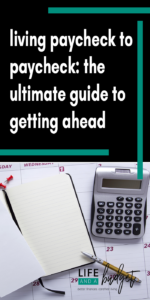Living paycheck to paycheck got you feeling all weary, doesn’t it?
 A few of you have reached out to me, either through email or the reader survey I sent out a few months ago. You have expressed concerned about being able to get ahead, but it just seems like you can’t make your paycheck last until your next payday.
A few of you have reached out to me, either through email or the reader survey I sent out a few months ago. You have expressed concerned about being able to get ahead, but it just seems like you can’t make your paycheck last until your next payday.
I have a goal of being one month ahead of my expenses; however, some of you are simply trying to stay $10 ahead. How can you possibly fathom being a month ahead of your expenses when you’re worried about right now?
I feel you. I really do and that’s why this advice is going to be a hard pill to swallow.
There isn’t some magic formula and you can’t wave a fairy wand and make this situation go away. Learning how to stop living from paycheck to paycheck isn’t an easy process.
You have to be willing to do the work involved to help you get ahead. If you’re not ready to do something about it, reading this won’t help.
I’ve written this for those of you who are ready to throw in the towel to this way of getting by and are finally ready to do everything possible to make paycheck to paycheck living a thing of the past.
If you’re with me, continue on.
Living Paycheck to Paycheck: The Ultimate Guide to Making Your Paycheck Last
1) Budgeting
This is the foundation, good people. If you don’t know where your money is going, it’s impossible to make your money last until your next paycheck.
It’s sort of like that saying my mama used to say, “out there spending money like its water.”
You turn on the faucet and you know all that extra water is going down the drain but you’re not sure how much water you’re wasting until the water bill comes.
The only way you’re going to know where you are spending all of your money is 1) by tracking your spending for a few months and 2) creating a budget to tell your money where to go in the future.
Tracking your spending helps you figure out where the money is going and the budget is telling your money that you want to spend it here instead of wasting it on stuff that doesn’t even matter to you.
Related Reading: Budgeting for Beginners: The Ultimate Budgeting Series and The Best Budget Binder to Use This Year
2) Stop overspending.
If you start tracking your money as suggested, you will be able to clearly see the areas where you’re overspending. You know, where you’re wasting water and all.
If your biggest area of overspending is in the takeout or dining out category, you have to find a solution to help you cut back or eliminate this spending altogether.
You can try using restaurant.com to save on date nights out or you can meal prep on Sunday so you have enough meals to take to work for lunch. If you’re brave enough and decide to cut the expense altogether, cook at home and start meal planning. Here’s a free 2 week meal plan to get you started.
Related Reading: 8 Easy Ways to Stop Overspending
3) Save on groceries
That brings me to my next point — groceries.
Food is usually the second largest expense besides shelter. There are several ways you can cut back spending in this category to help make your paycheck last longer.
You can stockpile on frequently used items when they are at rock bottom prices. There are apps like Ibotta that you download on your phone to save money on grocery and household items.
Most importantly, you can create meal plans and make a list of all items you need before you go grocery shopping. With a plan, you will be able to determine how much food you need to last you to your next paycheck.
Try Ibotta and get a free $10 bonus when you sign up. It’s free!
Related Reading: Reader Question:
How Do I Break an Eating Out Habit,
11 Easy Ways to Save Money on Groceries Without Coupons
4) Cut out unnecessary bills like cable.
I hear this all the time, “I’ve got to have my cable.”
This is cool and all, but if you’re struggling to make it to your next paycheck, either you’re willing to give up some things to get where you want or you can continue on with your regularly scheduled program.
I’ve been cable free for six years now. We most recently signed up for Sling that allows us to pay a subscription for certain sports and lifestyle channels only offered on cable.
Other than that, we’ve been winging it with Hulu, Netflix, and a good antenna like this one.
By doing this, we’ve added $130 back to our budget and it’s not killing us. We aren’t any less entertained than we were when we had cable.
And even if we get two to three months ahead and never have to entertain living paycheck to paycheck again, I wouldn’t be so eager to sign up for that cable package again.
This applies to any unnecessary bills you may have. If you have a gym subscription you aren’t using, you can get rid of it. If you still have a home phone but you’re never home, maybe you can eliminate it too.
You know your situation, so sit down and think of everything you’re spending money on and write it down. Then go through and mark out those things you can live without and add up your savings.
Related Reading: Can Cutting Cable Save Your Finances
5) Go on an all-cash diet.
If you’re living paycheck to paycheck, try going on an all-cash diet for your everyday spending. This wouldn’t apply to day-to-day bills that may come out of your checking account, like your mortgage.
I’m talking about your day-to-day spending like gas, groceries, grooming, medication, fun money, etc.
My friend Melody over at Broke on Purpose has some very pretty and affordable cash envelopes (shown above) that will help you divvy up your money by category.
There are 12 envelopes available and you can create your own bundle to get the envelopes for your particular expenses. The price is right on these too at just $1.25 to $2.00.
Check out the Broke on Purpose’s Money Envelopes here.
6) Get more for free!
There are a lot of different ways to get stuff for free, especially on the internet. You just have to exercise a little patience, of course.
My favorite way to get free stuff is through Swagbucks and taking surveys. I don’t take surveys as much as I used to, but I do buckle down and get a few done when I don’t want to spend my cash on a few upcoming expenses.
For instance, my daughter and I were in a wedding the week before Christmas. I didn’t want to spend any more money, so I got on my favorite survey site and started taking a few extra surveys.
Those extra surveys cashed out enough to get a gift card to Amazon where I purchased her flower girl shoes. Yes, honey. Shoes.
The two survey companies I earn the quickest from are Pinecone Research and Vindale Research. I also refer friends to Swagbucks from social media and earn passive Swagbucks on their Swagbucks earnings.
Check out this post for other awesome survey companies you can try.
7) If you shop online, make sure you’re getting free shipping and cash back.
If you’re shopping online, you might as well get something out of it. If you’re spending on true needs, those savings can certainly add up to a lot of money over time.
You can get cash back towards your purchases through sites like Ebates or MyPoints. By shopping through these portals, you can often score free shipping and other coupon deals on different websites like Macy’s, JCPenney, Old Navy, Bed Bath and Beyond, Target, Amazon, Wal-mart, Groupon, and more.
And even if you don’t shop online, Ibotta’s cash-back app gives you cash back for in-store shopping, including retail stores! Stop leaving money on the table. If there is a way to save, do it, but make sure you’re not spending just to get the savings (that’s a whole other topic for another day).
Sign up with Mypoints and get a free $10 gift card with your first $20 qualifying purchase.
8) Renegotiate or lower existing bills.
I recently lowered our security alarm bill using a service called Bill Cutterz. They will call the company for you and negotiate your price down for at least two years worth of service and you pay them half of the savings for the first year.
It was a fairly easy service to use and I was impressed at how quick they were able to get it done. However, I’m sure I could have gotten on the phone and did it myself had I not been so lazy.
So, if you want to save money, carve out the time to call your bill collectors and negotiate your bills or try out a service like Bill Cutterz (they aren’t paying me or anything and I’m not an affiliate of their product…just sharing in case you’re feeling a little lazy like me — nothing wrong with that.)
9) Have no spend days every week.
Another surefire way to make your paycheck last longer is to have a no spend day (days) every single week.
Your aim could be to avoid spending money on Fridays and Sundays. I usually have no spend days every other weekend. It’s quite easy for me since I don’t like going out in public and all.
There are other ways to keep yourself entertained other than spending money. By eliminating one coffee shop run and a run to a fast food joint, you’re looking at a $15 to $20 savings (minimum) right there.
Just choose your days and commit to spending no money. Make sure you plan ahead to have everything you need on those days so you won’t have to run out for ingredients or other needed items on those days.
Wrapping Thangs Up
We’ve already established that this isn’t going to be an easy task, but if you just do ONE of these things today, you’ll be on your way to making your paycheck last a little longer.
So here’s what you do, think of two things from this list you can do this week. Then next week focus on two more things. Repeat this until you’ve done everything on this list.
Over the course of a few months, I hope you’ll come back and share your testimony with me of how you’re making that paycheck last a little longer and getting one step closer to forgetting about that paycheck to paycheck life.
What’s the most difficult aspect of money management for you? Do you think some of this advice will help you with your situation? Weigh in!


